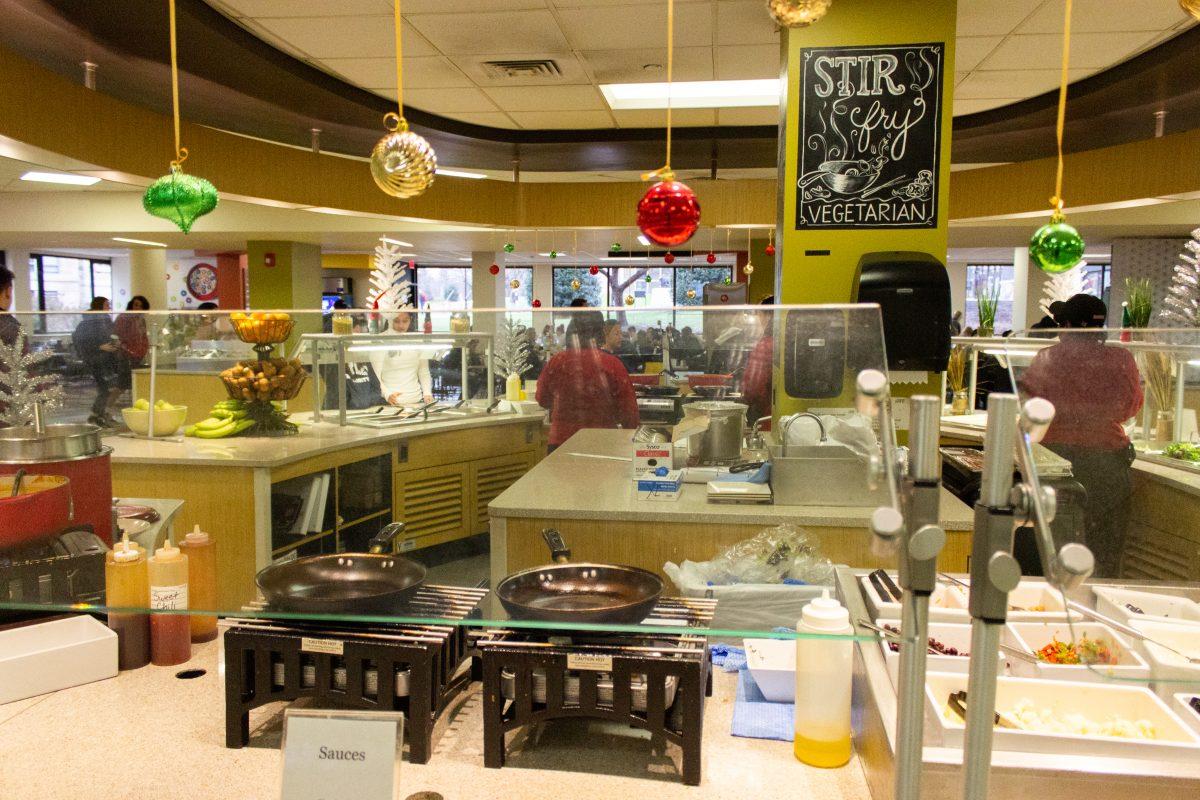Vegan students struggle with campus dining options
After watching a video about the meat industry shown to her by a third-grade classmate, Alyssa McDougall ’22 decided to stop eating meat.
“I remember being super grossed out,” McDougall said. “My love for animals definitely added to my feelings of disgust.”
McDougall said she became a vegetarian 10 years ago, but as her passion for animals grew, she decided to cut out animal by-products too and become a vegan.
McDougall is not alone.
In 2017, there was a 600 percent increase in people in the U.S. identifying as vegans over the last three years, according to a study from GlobalData. According to the report, in 2014, one percent of U.S. consumers claimed to be vegan. By 2017, it jumped to six percent.
But it’s not easy being vegan for St. Joe’s students who eat in Campion Dining Hall, despite new efforts by SJU Dining Services to include more menu options.
Ken Goldbach, general manager of SJU Dining Services, said the university and Aramark, the university’s food-service provider, recognize there is a shift in the growing number of students desiring plant-based menus.
Last year, SJU Dining introduced a vegetarian stir-fry station, which Goldbach said is also a vegan station. This year, SJU Dining implemented changes to include different lunch and dinner options at the vegan station.
Sophia Albano ’21, who is vegan, said last year she would regularly call her parents and tell them she was starving and didn’t know what to eat.
“Walking into Campion was definitely really disheartening because I would see my friends easily going for pizza, hamburgers or whatever the hot meal of the day was, but I was stuck with the same few options, stir-fry twice a day,” Albano said.
Liz Sweeney ’21, who has been eating a vegan diet for three years, said her difficulties in finding something to eat were compounded by inaccurate information.
“On the online menu, it would say that something was vegan, and then, in person there would be bacon bits or there would be butter in the vegetables,” Sweeney said. “I would often have to ask the workers what’s in the food, and they would have to leave and ask someone in the kitchen. Sometimes, I just didn’t have time to wait between my classes.”
Sweeney said she relied on the kindness of one of those workers.
“Last year, there was one woman in particular who was so sweet, and she knew I was vegan, so she would always give me an extra scoop of food and say, ‘Oh, honey, I know that you need this. You need to eat.’”
Goldbach said SJU Dining tries to work with students on a one-on-one basis to ensure that their needs are being met.
“We engage and invite the students to work with us early on in the process to understand how we can help them best navigate the dining hall,” Goldbach said.
Tim McGuriman, associate vice president of Administrative Services, confirmed the best way for students to take advantage of many of the offerings in the dining hall is to reach out to SJU Dining staff.
“Special dietary needs are addressed through consultation between the student and our management team and, as needed, our Student Health Service,” McGuriman said.
For many vegans, having to pay the same price for a meal plan that has so few options for them is hard to swallow.
Albano said she was wasting her money last year because, like all freshmen, she was required to pay $5,416 for the unlimited access meal plan.
“I felt really guilty because I wasn’t enjoying what I was eating,” Albano said. “It’s just so much money for so few options. And I definitely wasn’t getting the right amount of nutrients that I needed for a vegan diet.”
McGuriman said meal plan pricing is reviewed annually along with tuition and other fees.
Golbach said ultimately Dining Services has the task of meeting the dietary needs of nearly 2,800 students.
“We’re not only dealing with students who choose a vegetarian or vegan lifestyle, we also handle numerous students with a multitude of dietary and allergen restrictions,” Goldbach said.
Goldbach said the best way for students’ dietary needs to be met is through communication.
“We have an open policy where someone can stop in and simply ask for a manager or the executive chef,” Goldbach said.
While Sweeney recognizes SJU Dining’s efforts to be accessible, she is unsure of if changes will come about because of it.
“It’s really hard to tell if they’re actually doing anything,” Sweeney said. “I feel like I have a voice, but I don’t necessarily feel like it’s listened to.”














































